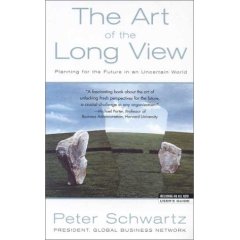Long Now board member Peter Schwartz‘s The Art of the Long View has topped the list of the most important futures works ever, in a worldwide vote by members of the Association of Professional Futurists (APF). Congratulations, Peter!
The Art of the Long View: Planning for the Future in an Uncertain World was first published in 01991, and describes a process for creating and using scenarios to help decision-makers navigate change, as incubated at Royal Dutch/Shell, and nurtured to maturity at Global Business Network (founded in 01987 by Schwartz together with Jay Ogilvy, Lawrence Wilkinson, Napier Collyns and Long Now’s Stewart Brand).
The honouring of Long View as the most important futures work by a group of futures consultants is, it seems to me, testimony to the role it played in popularising and legitimising scenario-based thinking and planning in organisations. Quite a few other books explaining and illustrating the development and use of scenarios have been published both before and since, but Schwartz presented a systematic, accessible, and reproducible approach to using scenarios that has garnered a wide audience and aged well. (Also among the book’s less celebrated impacts was my suggestion for the name of this blog.)
The Association of Professional Futurists announced the poll results last month (January 02007). APF is dedicated to “support[ing] professional futurists by advancing professional excellence, facilitating network and community building, and promoting the unique value proposition of futures work”. Founded in 02002, it has some 200 members worldwide comprising professional futures practitioners in consulting, business, and education sectors.
Other top-voted futures works were Foundations of Futures Studies: Human Science for a New Era (2 vols) by Wendell Bell; the multi-volume Knowledge Base of Futures Studies edited by Richard Slaughter, The Limits to Growth by the late Dana Meadows et al, and the State of the World series by The Worldwatch Institute.
[Disclosure: I’m an APF member, but as part of my ongoing effort to fit in with U.S. culture, didn’t bother to take part in the vote (:]
